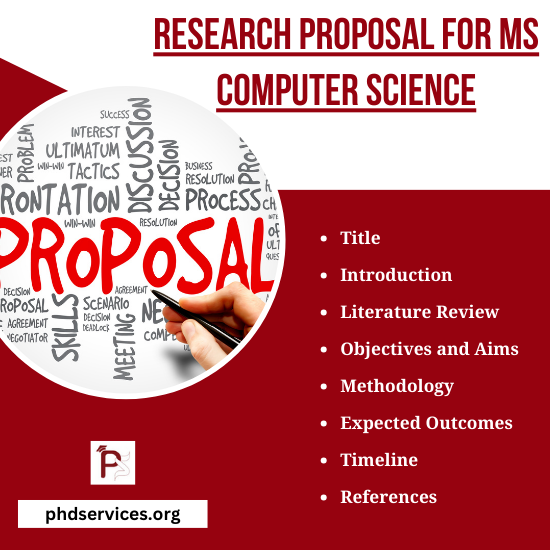Customised and effective Research Proposal for MS Computer Science are shared by our dedicated writers. Writing a research proposal is considered as challenging as well as a captivating process. Phdservices.org provides best solution as we deliver top-quality research proposals. It is significant to follow some guidelines while writing a proposal. Below we offer some instructions for formatting and writing the research proposal that assist you efficiently:
How do you write a research proposal for computer science?
Generally, in the computer science domain writing a research proposal is examined as both interesting and difficult. The following is an extensive direction that help us to write an interesting research proposal in computer science:
- Title
- Concise and Descriptive: It is advisable to select a title that explicitly denotes the nature of our study.
- Introduction
- Background: Encompassing major advancements in the research domain, we offer the background details for our study.
- Problem Statement: The issue we are resolving should be explained in an explicit manner.
- Research Question or Hypothesis: It is approachable to indicate the certain theories or query that our research intends to examine.
- Significance: The significance of our study and its possible influence on the domain of computer science must be described.
- Literature Review
- Current State of Knowledge: We outline previous studies that are relevant to our selected topic. It is necessary to find gaps that are addressed by our research objective.
- Relation to Our Work: In what way our suggested research enhances and relevant to previous study must be demonstrated.
- Objectives
- Main Goal: It is significant to explicitly describe the initial aim of our study.
- Sub-Goals: The major objectives must be categorized as attainable, certain sub-goals or focus.
- Methodology
- Approach: The research methodology that we aim to utilize should be defined. It can be quantitative, empirical, quantitative, etc.
- Data Collection: In what way we gather information must be described. The data might be collected by experiments, simulations, surveys, and software advancement.
- Analysis: It is appreciable to explain how we will examine the gathered data.
- Tools and Resources: Any certain software, hardware, or other sources that are essential should be mentioned.
- Expected Outcomes
- Predicted Findings: What outcomes we anticipate to identify should be explained.
- Implications: The possible significance of our anticipated findings must be described.
- Timeline
- Schedule: Our research project must be divided into sections such as literature survey, data gathering, analysis, and writing. For every section offer an estimated time limit.
- Budget (if applicable)
- Resources and Funding: Encompassing travel, sources, other costs, we summarize any expenses that are related to the study.
- References
- Citations: Structuring on the basis of recognized citation formats such as IEEE, APA, we involve a collection of every educational reference that is cited in our proposal.

What are some key considerations when developing a research proposal in computer science?
When it comes to developing a research proposal in computer science, there are several important factors to consider. Firstly, it is crucial to include a title page that clearly outlines the purpose of the proposal. Additionally, a well-crafted abstract is developed to provide a concise summary of the research. Furthermore, we draft a perfect introduction is essential, as it should not only provide background information but also captivate the reader’s attention. Lastly, a problem statement should be composed to clearly define the issue that the research aims to address. Our talented writers conduct thorough literature reviews and employ the latest research methodologies specific to your area of interest.
- Optimal Duplex Mode Selection for D2D-Aided Underlaying Cellular Networks
- Capacity Improvement for Full Duplex Device-to-Device Communications Underlaying Cellular Networks
- 3D Cellular Network Architecture with Drones for beyond 5G
- The Effect of Sand and Dust Storms (SDSs) and Rain on the Performance of Cellular Networks in the Millimeter Wave Band
- Auction Mechanisms for Virtualization in 5G Cellular Networks: Basics, Trends, and Open Challenges
- A Novel Deep-Learning-Enabled QoS Management Scheme for Encrypted Traffic in Software-Defined Cellular Networks
- An Analytical Framework for Coverage in Cellular Networks Leveraging Vehicles
- Deep Reinforcement Learning for User Association and Resource Allocation in Heterogeneous Cellular Networks
- Experimental Evaluation of Cellular Networks for UAV Operation and Services
- Load-Driven Resource Allocation for enhanced Interference mitigation in Cellular Networks
- Adaptive Traffic Management and Energy Cooperation in Renewable-Energy-Powered Cellular Networks
- Distributed Caching in Wireless Cellular Networks Incorporating Parallel Processing
- Mobility Assisted Content Transmission For Device-to-Device Communication Underlaying Cellular Networks
- Resource Allocation for Multiple Device-to-Device Cluster Multicast Communications Underlay Cellular Networks
- Enhancing the Spectrum Utilization in Cellular Mobile Networks by Using Cognitive Radio Technology
- Spectrum Sharing in mmWave Cellular Networks Using Clustering Algorithms
- PV Cell Angle Optimization for Energy Generation-Consumption Matching in a Solar Powered Cellular Network
- Autonomous distributed QoS aware sleep control considering carrier aggregation in heterogeneous cellular networks
- Covert Communications in D2D Underlaying Cellular Networks With Power Domain NOMA
- Experimental Quality Assessment of Cellular Networks and their Utilization for UAV Services